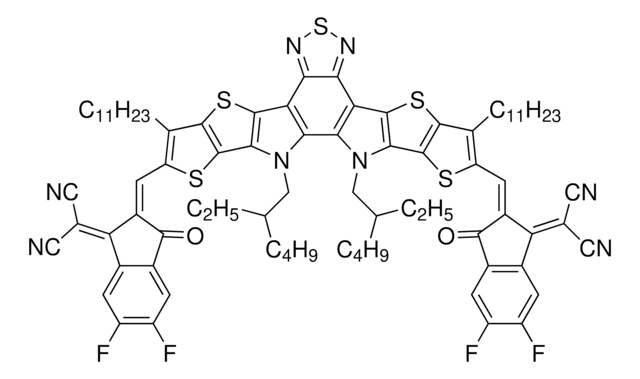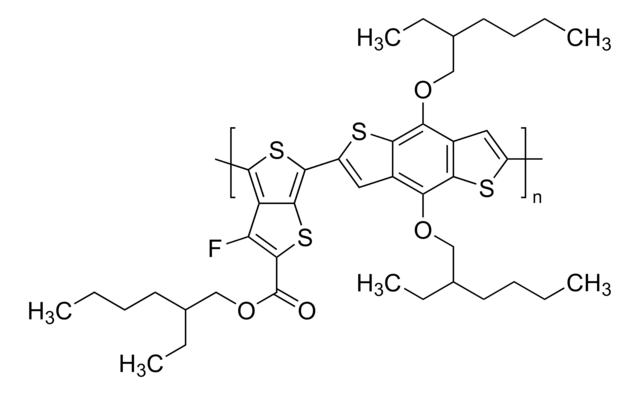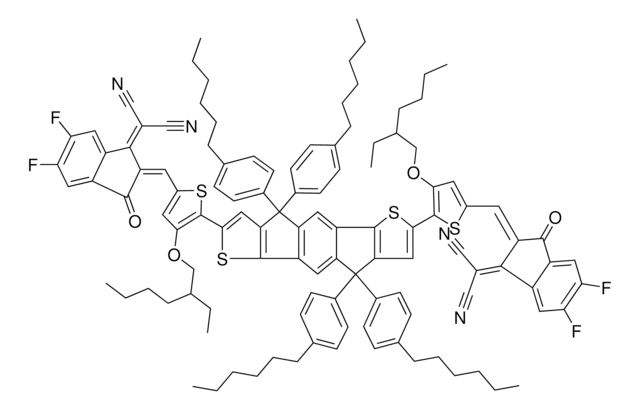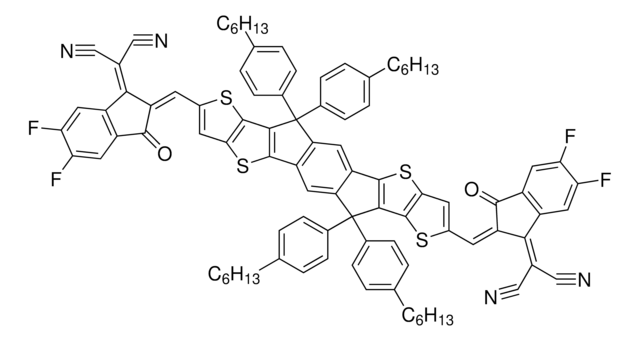772372
DTS(PTTh2)2
Synonym(s):
4,4′-[4,4-Bis(2-ethylhexyl)-4H-silolo[3,2-b:4,5-b′]dithiophene-2,6-diyl]bis[7-(5′-hexyl-[2,2′-bithiophen]-5-yl)-[1,2,5]thiadiazolo[3,4-c]pyridine], 5,5′-Bis{[4-(7-hexylthiophen-2-yl)thiophen-2-yl]-[1,2,5]thiadiazolo[3,4-c]pyridine}-3,3′-di-2-ethylhexylsilylene-2,2′-bithiophene
About This Item
Recommended Products
form
solid
Quality Level
mp
208-213 °C
solubility
chloroform: soluble(lit.)
dichlorobenzene: soluble(lit.)
λmax
655 nm in chloroform
SMILES string
CCC(CCCC)C[Si]1(CC(CCCC)CC)C2=C(SC(C3=NC=C(C4=CC=C(C5=CC=C(CCCCCC)S5)S4)C6=NSN=C63)=C2)C7=C1C=C(C8=NC=C(C9=CC=C(C%10=CC=C(CCCCCC)S%10)S9)C%11=NSN=C%118)S7
InChI
1S/C62H72N6S8Si/c1-7-13-17-19-23-41-25-27-47(69-41)49-31-29-45(71-49)43-35-63-57(59-55(43)65-75-67-59)51-33-53-61(73-51)62-54(77(53,37-39(11-5)21-15-9-3)38-40(12-6)22-16-10-4)34-52(74-62)58-60-56(66-76-68-60)44(36-64-58)46-30-32-50(72-46)48-28-26-42(70-48)24-20-18-14-8-2/h25-36,39-40H,7-24,37-38H2,1-6H3
InChI key
NOJURONZIGXBEP-UHFFFAOYSA-N
General description
Application
OPV Device Structure: ITO/MoOx/DTS(PTTh2)2: PC70BM/Al
- JSC = 14.4 mA/cm2
- VOC = 0.78 V
- FF = 0.59
- PCE = 6.7%
Storage Class Code
11 - Combustible Solids
WGK
WGK 3
Flash Point(F)
Not applicable
Flash Point(C)
Not applicable
Choose from one of the most recent versions:
Certificates of Analysis (COA)
Don't see the Right Version?
If you require a particular version, you can look up a specific certificate by the Lot or Batch number.
Already Own This Product?
Find documentation for the products that you have recently purchased in the Document Library.
Articles
Solution-processed organic photovoltaic devices (OPVs) have emerged as a promising clean energy generating technology due to their ease of fabrication, potential to enable low-cost manufacturing via printing or coating techniques, and ability to be incorporated onto light weight, flexible substrates.
Solution-processed organic photovoltaic devices (OPVs) have emerged as a promising clean energy generating technology due to their ease of fabrication, potential to enable low-cost manufacturing via printing or coating techniques, and ability to be incorporated onto light weight, flexible substrates.
Solution-processed organic photovoltaic devices (OPVs) have emerged as a promising clean energy generating technology due to their ease of fabrication, potential to enable low-cost manufacturing via printing or coating techniques, and ability to be incorporated onto light weight, flexible substrates.
Solution-processed organic photovoltaic devices (OPVs) have emerged as a promising clean energy generating technology due to their ease of fabrication, potential to enable low-cost manufacturing via printing or coating techniques, and ability to be incorporated onto light weight, flexible substrates.
Our team of scientists has experience in all areas of research including Life Science, Material Science, Chemical Synthesis, Chromatography, Analytical and many others.
Contact Technical Service![[6,6]-Phenyl C71 butyric acid methyl ester, mixture of isomers 99%](/deepweb/assets/sigmaaldrich/product/structures/716/624/9fb9f2f0-ae99-429f-8d3a-b12267976a4d/640/9fb9f2f0-ae99-429f-8d3a-b12267976a4d.png)








